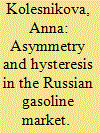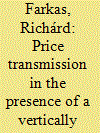| Srl | Item |
| 1 |
ID:
180163


|
|
|
|
|
| Summary/Abstract |
Using monthly data of 79 Russian regions from 2003 to 2017, we study the long-run relationship of the retail gasoline prices with the crude oil price and the nominal exchange rate. We find that models that were successfully applied to deal with asymmetries in other countries are not suitable for Russia without taking structural breaks into account. Once breaks are allowed, we find that there is no asymmetry in the long-run elasticities between the gasoline prices and the crude oil price, and no significant hysteresis. However, there is an asymmetric relation between the gasoline price and the exchange rate that has decreased over time. These results also hold after several robustness checks. The evidence reported in this work shows that the effects of the exchange rate on gasoline prices are much more difficult to control than the oil price, and they require a larger set of policy measures: the recent development of a plan to decrease the importance of hydrocarbons exports by producing clean hydrogen using electrolysis and pyrolysis and the potential future export of electricity generated using nuclear power and onshore wind farms may help to diversify the local economy and to shield it from new sanctions.
|
|
|
|
|
|
|
|
|
|
|
|
|
|
|
|
| 2 |
ID:
094885


|
|
|
|
|
| Publication |
2010.
|
| Summary/Abstract |
During the last twenty years, the Spanish petrol market has undergone an intensive restructuration process; it has changed from being a state-owned monopoly to total liberalization and privatization. This liberalization process was accompanied by measures that facilitated the creation of a "national champion," the Repsol Group, which is a huge, vertically integrated company with a high market share in all the industry's segments. Using a dynamic model, this paper analyses whether the prices established by companies in the Spanish gasoline market, after the restructuration process, fits with a tacit collusion equilibrium. The empirical results show that a strategic behaviour of companies occurs and is compatible with a tacit collusion price strategy. So, the restructuration process does not seem to have introduced effective competition into the Spanish gasoline market.
|
|
|
|
|
|
|
|
|
|
|
|
|
|
|
|
| 3 |
ID:
163534


|
|
|
|
|
| Summary/Abstract |
The present paper provides an empirical examination of cost pass-through on a market with a vertically integrated firm which has substantial market power in wholesale and faces competition in retail. Our investigation focuses on gasoline pricing in Hungary, where a court-case against the dominant firm on the market provides us with detailed evidence regarding the price-setting behavior of the vertically integrated agent. We find that when market power is stronger at the wholesale level, the company is likely to raise prices in response to cost increases faster than it adjusts them downwards in case of cost decreases on the wholesale market. This process is known as “asymmetric cost pass-through”. Our findings suggest that regulatory efforts on the market should not only encompass differences in firm mark-ups between franchisees of the firm and competitors in order to prevent foreclosure, but should also seek to evaluate the wholesale price margins applied to all firms. We supplement our results with an analysis of the behavior of the firm after an investigation into its pricing behavior and find that pass-through asymmetry decreases substantially on the wholesale level in the period after the investigation.
|
|
|
|
|
|
|
|
|
|
|
|
|
|
|
|